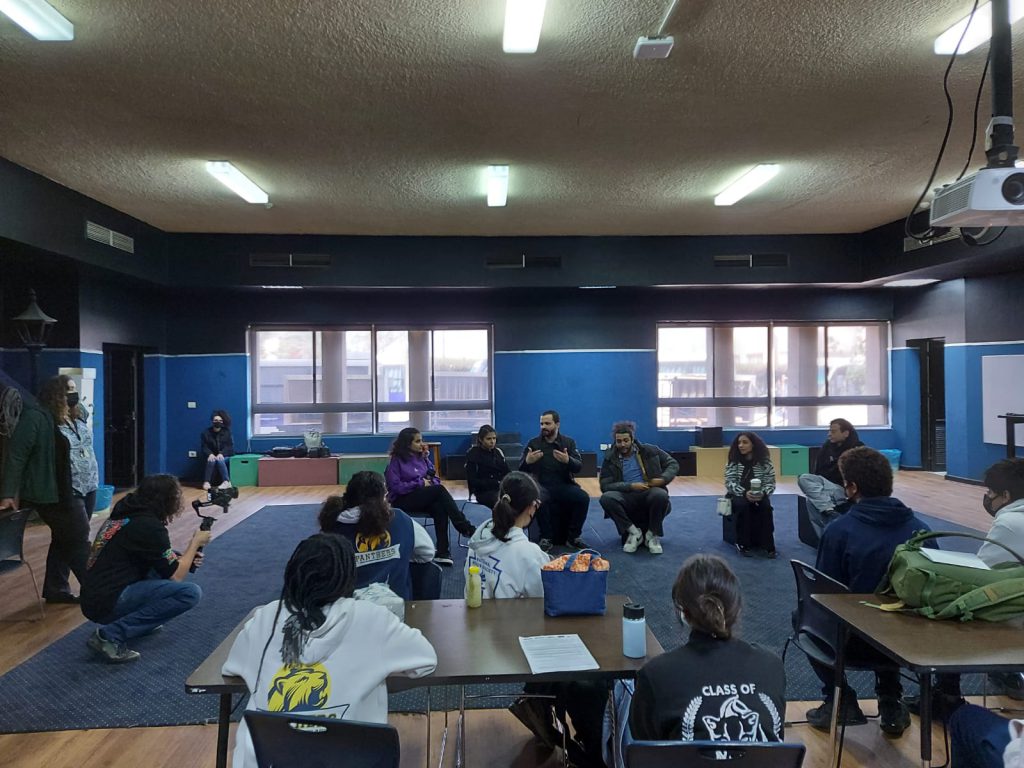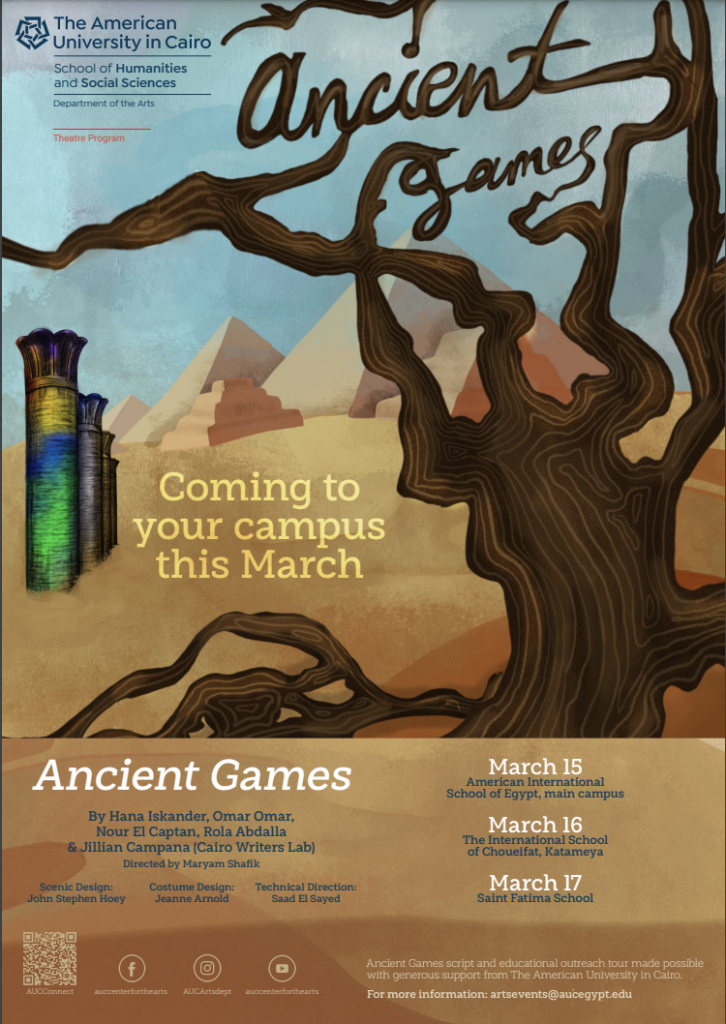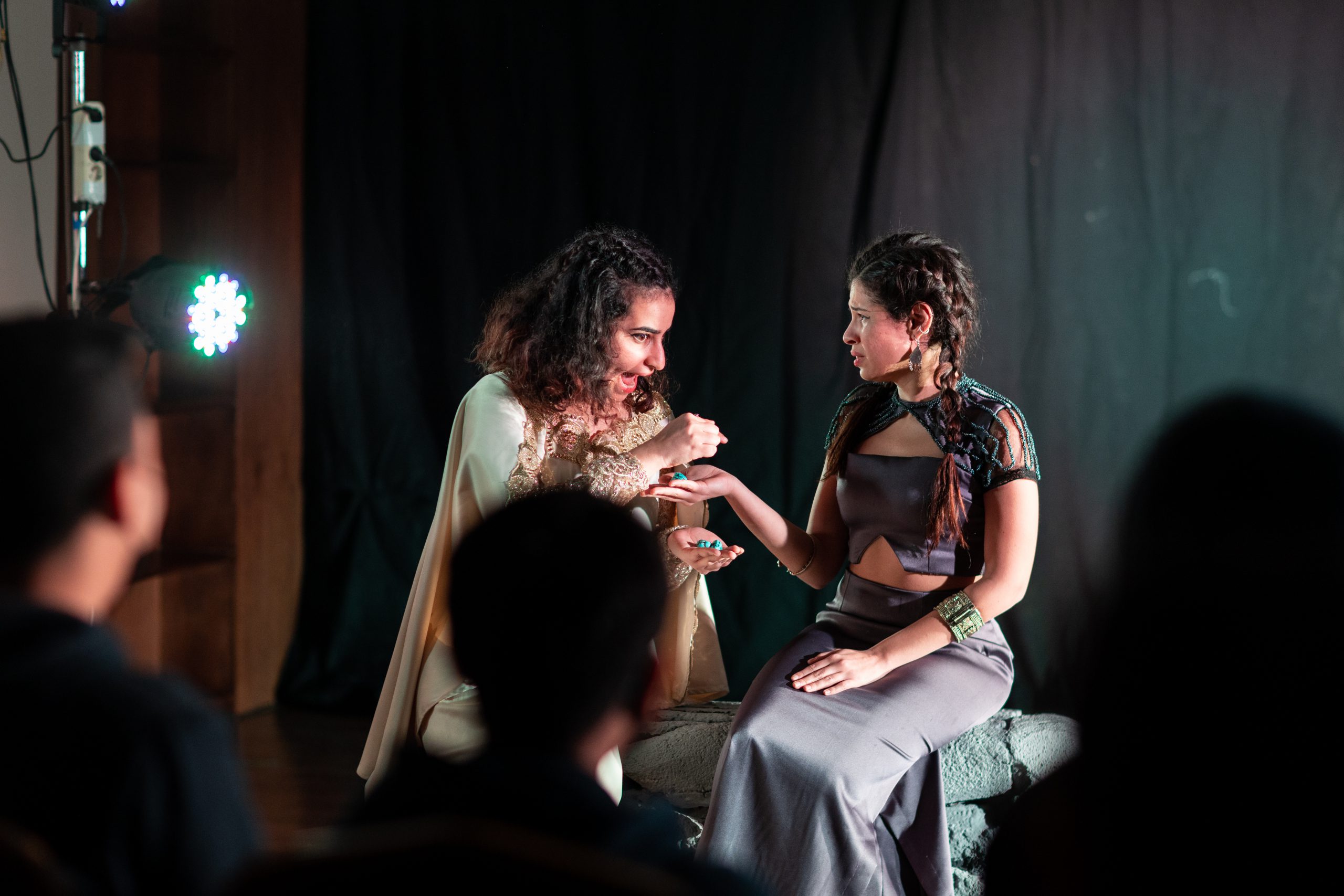University outreach programs involve instructional and professional activities conducted by faculty, staff and students with individuals and organizations not enrolled in the institution. While there is great merit for offering such programs on the university campus, there is also a huge benefit to taking the outreach off campus and “out” into the community, thereby reaching individuals far beyond those who choose, or are able, to partake in such programing and who may already have access to the university campus. There are many studies that discuss the impact an early university connection and a visit to a university campus, can have on a student’s likelihood of pursuing higher education (Burgess, et al, 2021; Venegas-Muggli, 2019; Jorgenson, et al, 2018; Turley, 2009), but in a city like Cairo, many schools, organizations and individual students cannot afford to take a day to visit a college campus, as much as they might like to. By traveling “out” into our community and to potential future stakeholders we make a profound statement about the value of those who are visited and our desire to establish a relationship with them. Going to visit schools, and their students and families, articulates a commitment to getting to know them and sets in motion a relationship that has potential for years to come.
The School of Humanities and Social Sciences (HUSS) has embarked upon an educational outreach initiative designed to share our programs and disciplines with young people in Cairo and beyond. This spring we engaged in five outreach projects involving the Theatre, Egyptology and Psychology programs. We visited four different schools and met with over 1,400 students. These projects ranged from large scale performances to short visits to schools to offer workshops, to a community conversation with parents. Projects targeted middle school, and high school students and their families. In some cases, the individuals and communities we visited were already well aware of AUC courses and options but for some, the information and exposure we provided was entirely new. And as we know, many families do not understand the value of studying the liberal arts, the humanities, social sciences or arts. While we acknowledge that students often work outside of the fields in which they study, we also know that families often look for programs that they believe offer a college graduate a direct path for employment. Part of our mission with the HUSS outreach initiative therefore is to educate young people and their families about the value of studying in HUSS fields and to expose them to the skills students develop in our disciplines, which include: civic and political engagement; innovative and creative imagination; empathic thinking and acting; critical writing, reading and speaking; and respect for diversity, justice and equality. We hope to make them more aware that the humanities and social sciences help us to understand who we are, how we can interact to better achieve our goals, and what we can do to create a stronger, more adaptable world.

One of the components of the HUSS outreach initiative, the educational outreach theatre production, was quite large in scope. The Theatre program’s original 50-minute play in hybrid Arabic-English toured to three schools in Cairo as part of the first year of this project. Funded by the Office of Associate Provost for Research, Innovation and Creativity (AP-RIC), supported by HUSS and aided in development by the Egyptology program and AUC alum, award winning playwright Yussef El Guindi, the play Ancient Games was transported from AUC to the schools. It was re-set and re-staged in their auditoriums and performed for almost 1000 students in schools in mid-March 2022. Part of the mission of the project is to share the cultural and literary stories of Egypt with young people. We wanted to expose the students to stories they may not be familiar with, and so for our first production, we chose a story that has both cultural and theatrical resonance. Ancient Games is a retelling of the Pharaonic death and resurrection myth of Osiris and Isis, one of the most important stories of ancient Egypt. Performances of this myth date back to temple rituals in Abydos as early as 2500 BCE and scholars now recognize this performance-ritual as the dawn of theatre. Many people still think that the art form originated in ancient Greece and so we wanted to educate the audience about theatre, the myth itself and the significance Egypt plays in the creation of the art form.

The play was written by a new independent collective of writers called The Cairo Writers Lab (founding members: HUSS students Hana Iskander, Nour El Captan and Rola Abdalla, HUSS alum Omar Omar and myself). We began work on this project over a year ago by choosing the story and defining the crucial action moments of the plot. We worked with Dr. Salima Ikram and her Egyptology students to make sure our research and historical information was accuarate and we received feedback from playwright Yussef El Guindi about the play’s structure. And of course, contacting and visiting schools to ascertain which would be a good fit for the play also took a good deal of time and effort. We wanted to start with schools that tend to feed students into AUC and that were also welcoming of the work and able to support a performance on their campus. When the play was written, cast, rehearsed, directed and designed, we transferred the entire set, lights, sound, costumes and cast and crew to the schools. During our visits we also met with counselors, teachers and students to educate them about the story and HUSS offerings. Student actors participated in service-learning when they visited classes after the performance and were given the opportunity to lead workshops in theatre and writing. We took AUC flyers and brochures and provided our contact information to facilitate future connections. Finally, we created an edited video version of the play to share with schools outside of Cairo, both in Egypt and the region. It was an enormous amount of work, but the effort paid off. We have already been invited back to the same schools to perform next year and we have received requests from other schools as well. Next year, this particular project will continue by offering another new play about ancient Egypt for even more schools. And in part because of this we are now working with HUSS departments to implement more talks and workshops at schools this fall.
We hope that as a result of this larger initiative, the pre-college students we reach will have a higher likelihood of applying, enrolling, attending and succeeding in university. And perhaps this exposure will incline them towards AUC and raise awareness and appreciation for the liberal arts. Many young people have a desire to attend a university such as AUC, but either lack the ability to follow through to apply or overlook our institution in favor of traveling abroad. Still others are unaware of potential scholarships and may feel they cannot afford AUC. The visits we were able to make to K-12 schools this past year helped to introduce potential students to AUC and to the liberal arts educational philosophy and the degrees HUSS offers. We were able to connect AUC to our surrounding community and provide access to, and information about, our institution. By providing educational outreach we informed, engaged and inspired young people and their families to consider pursuing an education with us.
References:
Burgess, A. P., Horton, M. S., & Moores, E. (2021). Optimising the impact of a multi-intervention outreach programme on progression to higher education: Recommendations for future practice and research. Heliyon, 7(7), e07518. Available at: https://doi.org/10.1016/j.heliyon.2021.e07518
Jorgenson, D., Farrell, L.C, Fudge, A.P. (2018). College connectedness: The student perspective. Journal of the Scholarship of Teaching and Learning, 18( 1), 75-95. Available at: 10.14434/josotl.v18i1.22371
Turley, R. N. L. (2009). College Proximity: Mapping Access to Opportunity. Sociology of Education, 82(2), 126–146. Available at: https://doi.org/10.1177/003804070908200202
Venegas-Muggli, J. I. (2019). Impact of a pre-college outreach programme on the academic achievements of higher education students: A case study of Chile. Higher Education Research & Development, 38:6, 1313-1327. Available at: https://www.tandfonline.com/doi/abs/10.1080/07294360.2019.1643295

